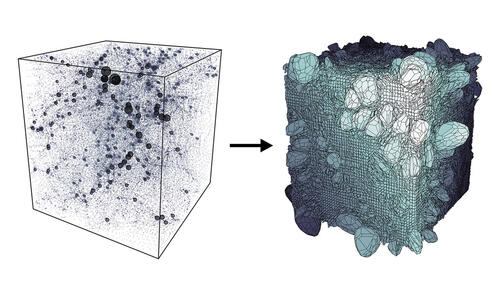
Ever feel like the universe is just a big carton of old milk? Well, you may be correct.
In a new study in the journal Physical Review Letters, Farnik Nikakhtar, a postdoctoral fellow in Yale’s Department of Physics, theorizes that, ever-so-slowly, the universe has become filled with lumpy clumps of matter. “Initially smooth and uniform with very tiny density fluctuations, Nikakhtar said, “the universe became clumpier over time as gravity pulled more matter into denser regions.”
Nikakhtar and his co-authors — Ravi K. Sheth of the University of Pennsylvania, Bruno Lévy of Centre Inria de Paris, and Roya Mohayaee of Institut d’Astrophysique de Paris and the University of Oxford — developed an “assumption-free” algorithm to model the universe’s initial density. The algorithm is based on the mathematical concept of “Optimal Transport Theory,” which seeks to understand the most efficient way of moving objects from one place to another.
“Optimal Transport is very well-suited to the problem of reconstructing the universe’s initial density field,” Nikakhtar said. “This method also opens up new possibilities for measuring cosmological parameters.”
At Yale, Nikakhtar is working with associate professor of physics and astronomy Nikhil Padmanabhan to apply the new algorithm to observations from the Dark Energy Spectroscopic Instrument (DESI), a cosmological survey that will map 40 million galaxies and quasars.
This Article has been extracted from the Yale News article of February 22, 2023. For more information, please see the full Yale News article, and the article in Physical Review Letters linked below.